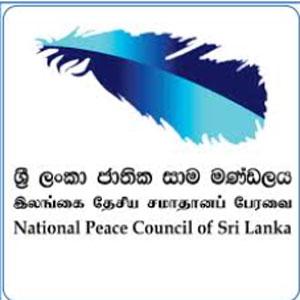29 Jul 2024 - {{hitsCtrl.values.hits}}
 Colombo, July 29 (Daily Mirror)- The National Peace Council called on the government to change its stance on the Supreme Court interim order restraining Deshabandu Tennakoon and abide by the Supreme Court's judgment to preserve the integrity of the country’s democracy and the rule of law.
Colombo, July 29 (Daily Mirror)- The National Peace Council called on the government to change its stance on the Supreme Court interim order restraining Deshabandu Tennakoon and abide by the Supreme Court's judgment to preserve the integrity of the country’s democracy and the rule of law.
Issuing a statement, they said the government’s refusal to implement the Supreme Court's judgment is not only reckless and irresponsible but also a direct threat to the rule of law.
"Much to the consternation of law abiding people the government has announced its decision not to act on the Supreme Court interim order restraining Deshabandu Tennakoon from functioning as the Inspector General of Police. Despite the ruling by the highest court in the land, the government insists that the Police IGP will continue to hold office.
Delivering a special statement in Parliament, Prime Minister Dinesh Gunawardena stated that the Supreme Court cannot change the approval granted by the Constitutional Council to appoint the current IGP and therefore the IGP continued in his position. President Ranil Wickremesinghe, who has declared his candidacy in the upcoming presidential election, has stated that he will not appoint an acting IGP as this may lead to election petitions being filed against him.
The present governmental stance undermines the foundational principle of parliamentary democracy, which relies on the separation of powers among the presidency, parliament, and the judiciary. These three branches of government are designed to function as a system of checks and balances, preventing the abuse of power by any single branch," the statement added.
They said by disregarding judicial decisions, the government sets a dangerous precedent that could erode public trust in the legal system and encourage similar behavior among elected officials at other levels of government.
"The 17th century English philosopher John Locke, asserted that “wherever law ends, tyranny begins.” Similarly, the 17th century French philosopher Montesquieu emphasized the necessity of separating governmental powers to prevent despotism: “There is no liberty if the judiciary power be not separated from the legislative and executive.” Regrettably, the government's current actions contradict these timeless principles and threaten the balance that sustains Sri Lanka’s democratic system.
They may submit their appeals through channels as provided by law without rejecting the order of the court. Political maneuverings to circumvent Supreme Court rulings are unacceptable," they said.
16 Nov 2024 4 hours ago
16 Nov 2024 5 hours ago
16 Nov 2024 6 hours ago
16 Nov 2024 6 hours ago
16 Nov 2024 7 hours ago